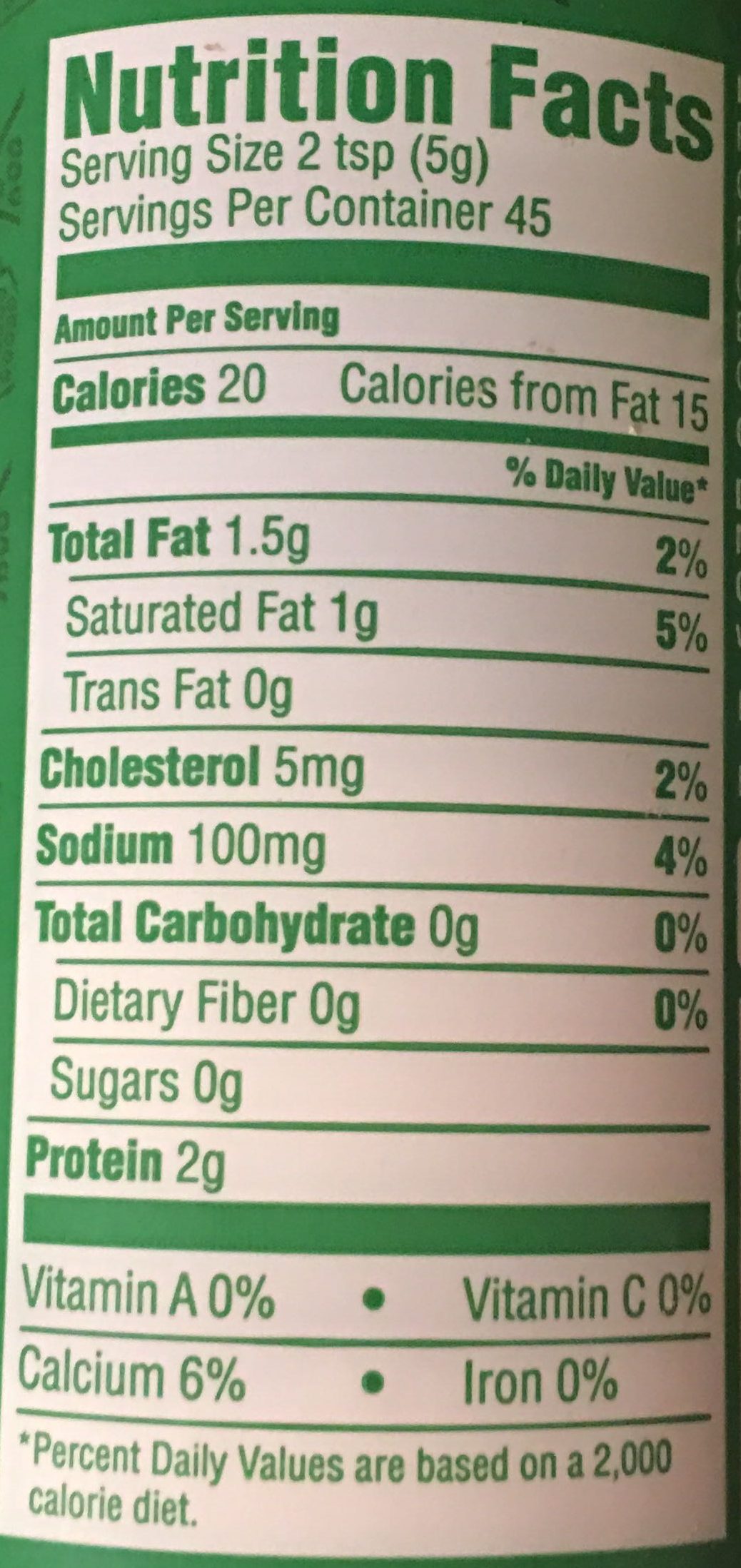Help us make food transparency the norm!
As a non-profit organization, we depend on your donations to continue informing consumers around the world about what they eat.
The food revolution starts with you!
Parmesan Romano & Asiago Grated Cheeses - Meijer - 8 oz (226g)
Parmesan Romano & Asiago Grated Cheeses - Meijer - 8 oz (226g)
This product page is not complete. You can help to complete it by editing it and adding more data from the photos we have, or by taking more photos using the app for Android or iPhone/iPad. Thank you!
×
Barcode: 0886926844399 (EAN / EAN-13) 886926844399 (UPC / UPC-A)
Quantity: 8 oz (226g)
Brands: Meijer
Brand owner: Meijer, Inc.
Categories: Dairies, Fermented foods, Fermented milk products, Cheeses, Italian cheeses, Grated cheese
Stores: Meijer
Countries where sold: France, United States
Matching with your preferences
Health
Ingredients
-
18 ingredients
parmesan cheese (pasteurized part skim milk, cheese cultures, salt, enzymes), romano cheese made from cow's milk (pasteurized part skim milk, cheese cultures, salt, enzymes), asiago cheese (pasteurized part skim milk, cheese cultures, salt, enzymes), powdered cellulose (added to prevent caking), potassium sorbate to protect flavorAllergens: MilkTraces: Milk
Food processing
-
Ultra processed foods
Elements that indicate the product is in the 4 - Ultra processed food and drink products group:
- Additive: E460 - Cellulose
Food products are classified into 4 groups according to their degree of processing:
- Unprocessed or minimally processed foods
- Processed culinary ingredients
- Processed foods
- Ultra processed foods
The determination of the group is based on the category of the product and on the ingredients it contains.
Additives
-
E460 - Cellulose
Cellulose: Cellulose is an organic compound with the formula -C6H10O5-n, a polysaccharide consisting of a linear chain of several hundred to many thousands of β-1→4- linked D-glucose units. Cellulose is an important structural component of the primary cell wall of green plants, many forms of algae and the oomycetes. Some species of bacteria secrete it to form biofilms. Cellulose is the most abundant organic polymer on Earth. The cellulose content of cotton fiber is 90%, that of wood is 40–50%, and that of dried hemp is approximately 57%.Cellulose is mainly used to produce paperboard and paper. Smaller quantities are converted into a wide variety of derivative products such as cellophane and rayon. Conversion of cellulose from energy crops into biofuels such as cellulosic ethanol is under development as a renewable fuel source. Cellulose for industrial use is mainly obtained from wood pulp and cotton.Some animals, particularly ruminants and termites, can digest cellulose with the help of symbiotic micro-organisms that live in their guts, such as Trichonympha. In human nutrition, cellulose is a non-digestible constituent of insoluble dietary fiber, acting as a hydrophilic bulking agent for feces and potentially aiding in defecation.Source: Wikipedia
-
E460ii - Powdered cellulose
Cellulose: Cellulose is an organic compound with the formula -C6H10O5-n, a polysaccharide consisting of a linear chain of several hundred to many thousands of β-1→4- linked D-glucose units. Cellulose is an important structural component of the primary cell wall of green plants, many forms of algae and the oomycetes. Some species of bacteria secrete it to form biofilms. Cellulose is the most abundant organic polymer on Earth. The cellulose content of cotton fiber is 90%, that of wood is 40–50%, and that of dried hemp is approximately 57%.Cellulose is mainly used to produce paperboard and paper. Smaller quantities are converted into a wide variety of derivative products such as cellophane and rayon. Conversion of cellulose from energy crops into biofuels such as cellulosic ethanol is under development as a renewable fuel source. Cellulose for industrial use is mainly obtained from wood pulp and cotton.Some animals, particularly ruminants and termites, can digest cellulose with the help of symbiotic micro-organisms that live in their guts, such as Trichonympha. In human nutrition, cellulose is a non-digestible constituent of insoluble dietary fiber, acting as a hydrophilic bulking agent for feces and potentially aiding in defecation.Source: Wikipedia
Ingredients analysis
-
Palm oil content unknown
Unrecognized ingredients: Romano-cheese-made-from-cow-s-milk, Potassium-sorbate-to-protect-flavorSome ingredients could not be recognized.
We need your help!
You can help us recognize more ingredients and better analyze the list of ingredients for this product and others:
- Edit this product page to correct spelling mistakes in the ingredients list, and/or to remove ingredients in other languages and sentences that are not related to the ingredients.
- Add new entries, synonyms or translations to our multilingual lists of ingredients, ingredient processing methods, and labels.
If you would like to help, join the #ingredients channel on our Slack discussion space and/or learn about ingredients analysis on our wiki. Thank you!
-
Non-vegan
Non-vegan ingredients: Parmigiano reggiano, Pasteurized semi-skimmed milk, Pasteurized semi-skimmed milk, Asiago, Pasteurized semi-skimmed milkSome ingredients could not be recognized.
We need your help!
You can help us recognize more ingredients and better analyze the list of ingredients for this product and others:
- Edit this product page to correct spelling mistakes in the ingredients list, and/or to remove ingredients in other languages and sentences that are not related to the ingredients.
- Add new entries, synonyms or translations to our multilingual lists of ingredients, ingredient processing methods, and labels.
If you would like to help, join the #ingredients channel on our Slack discussion space and/or learn about ingredients analysis on our wiki. Thank you!
-
Vegetarian status unknown
Unrecognized ingredients: Romano-cheese-made-from-cow-s-milk, Potassium-sorbate-to-protect-flavorSome ingredients could not be recognized.
We need your help!
You can help us recognize more ingredients and better analyze the list of ingredients for this product and others:
- Edit this product page to correct spelling mistakes in the ingredients list, and/or to remove ingredients in other languages and sentences that are not related to the ingredients.
- Add new entries, synonyms or translations to our multilingual lists of ingredients, ingredient processing methods, and labels.
If you would like to help, join the #ingredients channel on our Slack discussion space and/or learn about ingredients analysis on our wiki. Thank you!
-
Details of the analysis of the ingredients
We need your help!
Some ingredients could not be recognized.
We need your help!
You can help us recognize more ingredients and better analyze the list of ingredients for this product and others:
- Edit this product page to correct spelling mistakes in the ingredients list, and/or to remove ingredients in other languages and sentences that are not related to the ingredients.
- Add new entries, synonyms or translations to our multilingual lists of ingredients, ingredient processing methods, and labels.
If you would like to help, join the #ingredients channel on our Slack discussion space and/or learn about ingredients analysis on our wiki. Thank you!
: parmesan cheese (pasteurized part skim milk, cheese cultures, salt, enzymes), romano cheese made from cow's milk (pasteurized part skim milk, cheese cultures, salt, enzymes), asiago cheese (pasteurized part skim milk, cheese cultures, salt, enzymes), powdered cellulose (added to prevent caking), potassium sorbate to protect flavor- parmesan cheese -> en:parmigiano-reggiano - vegan: no - vegetarian: maybe - ciqual_food_code: 12120 - percent_min: 20 - percent_max: 100
- pasteurized part skim milk -> en:pasteurized-semi-skimmed-milk - vegan: no - vegetarian: yes - ciqual_food_code: 19042 - percent_min: 5 - percent_max: 100
- cheese cultures -> en:lactic-ferments - vegan: maybe - vegetarian: yes - percent_min: 0 - percent_max: 50
- salt -> en:salt - vegan: yes - vegetarian: yes - ciqual_food_code: 11058 - percent_min: 0 - percent_max: 5.08
- enzymes -> en:enzyme - vegan: maybe - vegetarian: maybe - percent_min: 0 - percent_max: 5.08
- romano cheese made from cow's milk -> en:romano-cheese-made-from-cow-s-milk - percent_min: 0 - percent_max: 50
- pasteurized part skim milk -> en:pasteurized-semi-skimmed-milk - vegan: no - vegetarian: yes - ciqual_food_code: 19042 - percent_min: 0 - percent_max: 50
- cheese cultures -> en:lactic-ferments - vegan: maybe - vegetarian: yes - percent_min: 0 - percent_max: 25
- salt -> en:salt - vegan: yes - vegetarian: yes - ciqual_food_code: 11058 - percent_min: 0 - percent_max: 5.08
- enzymes -> en:enzyme - vegan: maybe - vegetarian: maybe - percent_min: 0 - percent_max: 5.08
- asiago cheese -> en:asiago - vegan: no - vegetarian: maybe - ciqual_proxy_food_code: 12999 - percent_min: 0 - percent_max: 33.3333333333333
- pasteurized part skim milk -> en:pasteurized-semi-skimmed-milk - vegan: no - vegetarian: yes - ciqual_food_code: 19042 - percent_min: 0 - percent_max: 33.3333333333333
- cheese cultures -> en:lactic-ferments - vegan: maybe - vegetarian: yes - percent_min: 0 - percent_max: 16.6666666666667
- salt -> en:salt - vegan: yes - vegetarian: yes - ciqual_food_code: 11058 - percent_min: 0 - percent_max: 5.08
- enzymes -> en:enzyme - vegan: maybe - vegetarian: maybe - percent_min: 0 - percent_max: 5.08
- powdered cellulose -> en:e460ii - vegan: yes - vegetarian: yes - percent_min: 0 - percent_max: 25
- added to prevent caking -> en:anti-caking-agent - percent_min: 0 - percent_max: 25
- potassium sorbate to protect flavor -> en:potassium-sorbate-to-protect-flavor - percent_min: 0 - percent_max: 20
Nutrition
-
Bad nutritional quality
⚠ ️Warning: the amount of fruits, vegetables and nuts is not specified on the label, it was estimated from the list of ingredients: 0This product is not considered a beverage for the calculation of the Nutri-Score.
Positive points: 5
- Proteins: 5 / 5 (value: 40, rounded value: 40)
- Fiber: 0 / 5 (value: 0, rounded value: 0)
- Fruits, vegetables, nuts, and colza/walnut/olive oils: 0 / 5 (value: 0, rounded value: 0)
Negative points: 24
- Energy: 4 / 10 (value: 1674, rounded value: 1674)
- Sugars: 0 / 10 (value: 0, rounded value: 0)
- Saturated fat: 10 / 10 (value: 20, rounded value: 20)
- Sodium: 10 / 10 (value: 2032, rounded value: 2032)
The points for proteins are counted because the product is in the cheeses category.
Nutritional score: (24 - 5)
Nutri-Score:
-
Nutrient levels
-
Fat in moderate quantity (20%)
What you need to know- A high consumption of fat, especially saturated fats, can raise cholesterol, which increases the risk of heart diseases.
Recommendation: Limit the consumption of fat and saturated fat- Choose products with lower fat and saturated fat content.
-
Saturated fat in high quantity (20%)
What you need to know- A high consumption of fat, especially saturated fats, can raise cholesterol, which increases the risk of heart diseases.
Recommendation: Limit the consumption of fat and saturated fat- Choose products with lower fat and saturated fat content.
-
Sugars in low quantity (0%)
What you need to know- A high consumption of sugar can cause weight gain and tooth decay. It also augments the risk of type 2 diabetes and cardio-vascular diseases.
Recommendation: Limit the consumption of sugar and sugary drinks- Sugary drinks (such as sodas, fruit beverages, and fruit juices and nectars) should be limited as much as possible (no more than 1 glass a day).
- Choose products with lower sugar content and reduce the consumption of products with added sugars.
-
Salt in high quantity (5.08%)
What you need to know- A high consumption of salt (or sodium) can cause raised blood pressure, which can increase the risk of heart disease and stroke.
- Many people who have high blood pressure do not know it, as there are often no symptoms.
- Most people consume too much salt (on average 9 to 12 grams per day), around twice the recommended maximum level of intake.
Recommendation: Limit the consumption of salt and salted food- Reduce the quantity of salt used when cooking, and don't salt again at the table.
- Limit the consumption of salty snacks and choose products with lower salt content.
-
-
Nutrition facts
Nutrition facts As sold
for 100 g / 100 mlAs sold
per serving (2 tsp (5g))Compared to: Grated cheese Energy 1,674 kj
(400 kcal)83.7 kj
(20 kcal)+10% Fat 20 g 1 g -28% Saturated fat 20 g 1 g +9% Trans fat 0 g 0 g Cholesterol 100 mg 5 mg +6% Carbohydrates 0 g 0 g -100% Sugars 0 g 0 g -100% Fiber 0 g 0 g -100% Proteins 40 g 2 g +52% Salt 5.08 g 0.254 g +263% Vitamin A 0 µg 0 µg -100% Vitamin C (ascorbic acid) 0 mg (0 % DV) 0 mg Potassium 200 mg 10 mg +193% Calcium 1,200 mg 60 mg +52% Iron 0 mg 0 mg -100% Fruits‚ vegetables‚ nuts and rapeseed‚ walnut and olive oils (estimate from ingredients list analysis) 0 % 0 %
Environment
-
Eco-Score C - Moderate environmental impact
⚠ ️Select a country in order to include the full impact of transportation.The Eco-Score is an experimental score that summarizes the environmental impacts of food products.→ The Eco-Score was initially developped for France and it is being extended to other European countries. The Eco-Score formula is subject to change as it is regularly improved to make it more precise and better suited to each country.Life cycle analysis
-
Average impact of products of the same category: C (Score: 54/100)
Category: Camembert cheese, from cow's milk
Category: Camembert cheese, from cow's milk
- PEF environmental score: 0.50 (the lower the score, the lower the impact)
- including impact on climate change: 5.24 kg CO2 eq/kg of product
Stage Impact Agriculture
84.4 %Processing
5.6 %Packaging
4.4 %Transportation
3.3 %Distribution
1.8 %Consumption
0.5 %
Bonuses and maluses
-
Origins of ingredients with a medium impact
Bonus: +2
Environmental policy: +2
Transportation: 0
Origin of the product and/or its ingredients % of ingredients Impact Italy 100 %Medium
-
Packaging with a medium impact
Malus: -10
Shape Material Recycling Impact Box Plastic High
Eco-Score for this product
-
Impact for this product: C (Score: 46/100)
Product: Parmesan Romano & Asiago Grated Cheeses - Meijer - 8 oz (226g)
Life cycle analysis score: 54
Sum of bonuses and maluses: -8
Final score: 46/100
-
Carbon footprint
-
Equal to driving 2.7 km in a petrol car
524 g CO² per 100g of product
The carbon emission figure comes from ADEME's Agribalyse database, for the category: Camembert cheese, from cow's milk (Source: ADEME Agribalyse Database)
Stage Impact Agriculture
85.1 %Processing
5.0 %Packaging
5.0 %Transportation
4.0 %Distribution
0.7 %Consumption
0.1 %
Packaging
-
Packaging with a medium impact
-
Packaging parts
Box (Plastic)
-
Packaging materials
Material % Packaging weight Packaging weight per 100 g of product Plastic
-
Transportation
-
Origins of ingredients
Origins of ingredients with a medium impact
Origin of the product and/or its ingredients % of ingredients Impact Italy 100 %Medium
Report a problem
-
Incomplete or incorrect information?
Category, labels, ingredients, allergens, nutritional information, photos etc.
If the information does not match the information on the packaging, please complete or correct it. Open Food Facts is a collaborative database, and every contribution is useful for all.
Data sources
Product added on by openfoodfacts-contributors
Last edit of product page on by kiliweb.
Product page also edited by aaronasachimp, beniben, inf, org-database-usda, packbot, scanbot, sm-games, yuka.sY2b0xO6T85zoF3NwEKvllQcD8aOgS_nGg3Tnk2p6dTSBM3PWvxu6JnkEqo, yuka.sY2b0xO6T85zoF3NwEKvlmVrQ-LlvgnHDizfhUvS_-iDHIy1Weopz6rfN6g.











